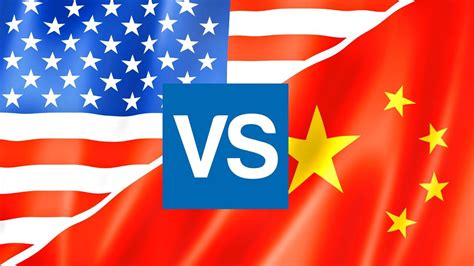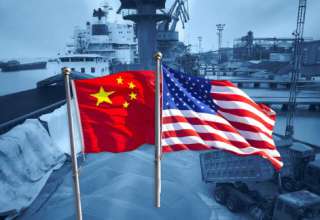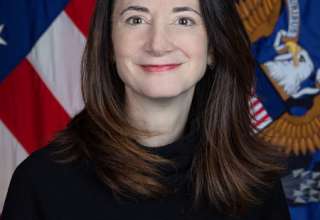By Brian Boyd, July 2023
This is the first of a three part-series that examines the strategic reasons for the AUKUS pact and the dangers for Australia.
INTRODUCTION
The first half of 2023 saw the political position of Australia changing dramatically, specifically in relation to the often stated “dangerous deterioration in relations between the two superpowers”, the US and China. This development deserves intense scrutiny.
It is crucial that a comprehensive public debate occur within Australia, over the scant details emerging from the federal government’s Defence Strategic Review (2023), the previous Defence Innovation Review (2021) and the media hype surrounding the AUKUS agreement, with the proposed acquisition of nuclear powered submarines.
Why? Because there is a concerted push by a small band of arch-right/neoliberal armchair ‘experts’, promoting a position that Australia has no choice but to join the US in any future conflict with China. These reactionary pro-war elements are repetitively trying to set the agenda, insisting the case for war has already been made.
Two key ingredients needed for this urgent public discourse – are the re-emergence of an effective, broad based anti-war/peace movement and for an acceptable national defence posture, defined by real national sovereignty with a corresponding, independent foreign policy.
Underpinning this public scrutiny will require an honest recognition and open acknowledgement, by our politicians, that the current age of great-power rivalry is all about a shakedown of the world economy. The competing economic power blocs are causing, in turn, a number of global flashpoints.
The confected narrative by the pro-war hawks in Canberra postures that the tension between the US and China is only to be framed as a product of an existential security threat, in isolation. They are desperate to play down that it is the economic competition between the great powers driving their persistent ‘war talk’, knowing full well that large sections of the public will not support going to war over how big companies and corporations make their money.
SPHERES OF INFLUENCE
Back in January 2023, at the annual meeting of the World Economic Forum in Davos, there was wide acceptance by the “titans of commerce” that great power rivalry, especially between the US and China, is creating ‘pressure to pick sides’ and ‘imposing new economic priorities’.
The risk of direct conflict between superpowers was discussed, with particular recognition given to the “economic dimension to the stand-off”.
One commentator wrote on the mood at the WEF: “the fear haunting the WEF is that a long period of peace, prosperity and global economic integration could be coming to a close”. This year’s Davos slogan was: “Co-operation in a fragmented world””. Another commentator was to write: “The US is seeking to persuade countries to reduce their dependence on China, as nations and companies in the Asia-Pacific refashion supply chains… as tensions mount between the world’s two biggest economies. These tensions began over trade but have widened to include technology, national security and foreign policy”. Similarly another commentator wrote: “Beijing… has built on China’s growing heft as the second-largest economy… [with]… initiatives that Washington [and other major power blocs]… worry will expand into strategic influence at their expense”.
Other commentators have added their voice to this global economic picture: –
-“A new economic order for the globe is being constructed, based around heavy government intervention, a disregard for existing trade and subsidy rules, and the sometimes aggressive defence of perceived national interests”.
-“It is striking how the US government has mirrored China’s state-run regime, by wrestling control of the free market”.
-“China’s untrammelled rise as a major economic power has been the main structural driver of the global order these past three decades, reshaping trading patterns, diplomatic alliances and the centre of world gravity”.
-“The ultimate test is whether China can be variously contained, engaged, competed and cajoled into accepting the US-led order”.
-In early May the U.S. Senate announced “a major cross-party effort to combat China’s growing global influence by limiting the flow of investment and technology to the Asian giant… The push comes after President Biden signed a package in 2022 aimed at boosting competition with Washington’s main economic rival, with $52 billion in new subsidies” to American big business.
-Also in May the British Prime Minister said China “represents the single biggest state threat to our economic security… [with its]…“intent to try to reshape the rules-based international system”.
In mid – April the International Monetary Fund warned of the increased cost of economic friction associated with the global economy defragmenting into geopolitical blocs, with the US on one side and China on the other.
The IMF emphasised that the resulting fragmentation of the global economy could increase financial stability risks and potentially reduce global economic output. A US Treasury official said China was also contributing to fragmentation by keeping vast sectors of its economy off-limits to foreign competition.
In the first week of July the US Treasury Secretary Janet Yellen visited China, describing the competition between the world’s biggest economies as not a “winner-take-all” situation. The US Treasury Secretary went on to say: “We seek healthy economic competition… with a fair set of rules, that can benefit both countries over time…we believe that the world is big enough for both of our countries to thrive.”
Ms Yellen said that the US and China should deepen communication and work toward a “stable and constructive relationship”, adding that the US was not seeking “a whole-sale separation of our economies”. Under the heading: ‘US calls for fair play with China in economic battle’, a Melbourne newspaper (9/7/23) quoting Reuters said: “Yellen’s high-stakes visit comes as the US and China are locked in a tit-for-tat trade war…”.
In a follow up report Reuters described the Yellen visit as “aimed to reassure [Chinese] officials the US isn’t trying to hold back its biggest economic rival”. This is not what the Hawks have been saying for years! One commentator pointed out after the visit – the 2024 US presidential campaign will be dominated by the “persistent US-Sino rivalry” issue, noting “the toxins in US domestic politics over China” are embedded.
On 11 April the French president Macron made a speech that suggested the European Union should break free from its economic dependence on the US and China, suggesting both were ‘twin threats’ and that the EU should develop its own “sovereignty” and have a policy of “strategic autonomy”. His speech went on to suggest that the EU should be a ‘third superpower’ and not become “a vassal” to the other two superpowers. The French president pushed the concept of France as a “balancing power” between superpower-aligned blocs.
The EU, Macron suggested ‘must create a vigorous industrial policy and intervene in markets as Washington and Beijing are doing’!
Similarly, post-Brexit, the concept of ‘Global Britain’ has been floated as a revamped separate economic power bloc, pathetically promoted as echoing Britain’s imperial, ‘past glory’ days, by its politicians.
Macron’s EU status enhancement proposal and Britain’s revamped 21st-century ambitions, like those of Russia, China and the US, are not benign.
They go to the heart of the clashing economic ‘spheres of influence’ of these great powers, driven by their respective corporate, multinational, oligarchy capitalism, and state-based enterprises, wishing to further expand their worldwide operations. They are all exercising their respective manifestations of 21st-century imperialism.
After the Berlin wall fell in 1989 the neoliberal right and free marketeers, triumphantly claimed victory in the Cold War and the ascension of the US becoming the number one superpower. But the relationship between the world’s major nation states did not remain static. The growth of globalisation, accompanied by enormous wealth disparity in many parts of the world, saw the global economic dynamics morph into great power rivalry and competing spheres of influence. Unfair trade practices by all centres of power became commonplace and the World Trade Organisation (WTO) had its role gutted, particularly by the US.
The essential economic basis of 21st-century great power tension, cannot be overstressed.
Yet, there is much confected theatre by a cabal of so-called security ‘experts’ pushing that the core basis of the increasing global tensions is instead, all about stand alone, existential security and military threats. This, in turn, is being used to justify a full – on global arms race. This ‘war talk’ narrative is never-ending, as are the token claim that peaceful solutions are preferable.
AVOIDING CONFLICT?
Where does Australia sit in this international uncertainty?
In the lead up to the AUKUS announcements in March, Australia’s Foreign Minister Penny Wong commented on Australia’s ‘deteriorating strategic circumstances’ in the Indo- Pacific.
Ms Wong placed great emphasis on Australia’s mission is to have to a say in the region, stating that Australia should use its agency to “use our national power, our influence, our networks, our capabilities, to avert catastrophic conflict”.
In the AFR magazine of March 2023, Foreign Minister Wong expressed the view that Australia will not follow Washington ‘blindly’ on foreign policy. This seemed to be an attempt to recast Australia as an independent player in the region with the aim to strike a “strategic equilibrium”. She wanted to change the way the world sees Australia. In an earlier speech, Minister Wong warned about the danger of all nations becoming “hostages to history”, through the inability of the US and China to manage competition. Minister Wong said: “It’s the risk of the contest escalating into conflict and the consequences for the whole world”, that keeps her up at night.
Many ordinary Australians would not disagree with such sentiments.
Foreign Minister Wong went on to say that the Americans needed to do more to reduce the risk of open conflict with China, adding China also had to prioritise stability and transparency.
She gave recognition to many of Australia’s South-East Asian neighbours having a long-standing distaste for great power rivalry, with many not wishing to become pawns in the US-China strategic competition.
She even criticised the previous decade of Liberal/National party government’s having “allowed old narratives to re-emerge”, positioning Australia to become an “outsider”.
Foreign Minister Wong added: “We all desire a region where no country dominates or is dominated”.
“Australia sees our investment in our future defence capabilities as essential for deterring conflict and maintaining a strategic balance in the Indo-Pacific. A balance where regional peace prevails and sovereignty of all nations-large and small-is preserved.
“So we are resolved to have capabilities that contribute to the strategic equilibrium… our historic AUKUS partnership… will help us maintain our capability… and complement our collective efforts to ensure regional stability and security.
Some commentators ventured to suggest that regional middle powers like Australia, could work with other countries to promote a multipolar system rather than a bipolar system, to address the increasing economic, military and strategic competition between the great powers.
In a speech at the National press club (17/4/23) Minister Wong further elucidated on how Australia can help “avert war and maintain peace”. She argued “by having strong defence capabilities of our own…” Australia can help shape the region and “ensure that no state will ever conclude that the benefits of conflict outweigh the risks”. Minister Wong reflected on Australia’s history, especially mentioning the Menzies and Howard eras, where Australia’s foreign policy was simply to attach ourselves to the US. “We will always pursue greater self-reliance and a more active foreign policy”, she added. Further, she urged Australia’s regional neighbours to deepen their cooperation and build up their militaries to contribute to a “strategic balance,” that will preserve stability amid the intensifying competition between the US and China.
Minister Wong went on to stress the need to avoid reducing current global tensions to a “binary” contest for primacy between the US and China. Propositions such as the need to “lower the heat on any potential conflict” and maintain the “status quo”, were also floated by Australia’s Foreign Minister.
Unfortunately, both China and the US beg to disagree in both her words and actions, as such noble but wishful thinking does not address the grinding clash of the opposing economic ‘spheres of influence’.
One leading pro-war hawk took exception to Minister Wong’s tone and language. Her emphasis on ‘great power competition’ per se, being the threat to world peace, was not acceptable. Her speech, he argued, failed “to set out a strong enough foreign policy position” that the US alliance in effect “ties Australia into one side of the regions great power competition” and the call for the “status quo” gives too much of a concession China!
Most of Minister Wong’s generalised sentiments, while sounding reasonable, lack scope to allow any critical examination of the underlying assumptions being relied on by the government to declare Australia is facing a ‘challenging strategic environment’. The vast military expenditure, as proposed under AUKUS, in reality is not “our own” defence sovereign capacity but a further enmeshing of Australia into the US military global posture.
It is worth noting that in a recent ‘Quarterly’ magazine article armchair security expert David Kilcullen put forward that the current diplomatic efforts in the Pacific was actually mainly about some of the island nations becoming “launching pads” for the future positioning of US missiles. Has Kilcullen but the cat out of the bag? Is Australia’s diplomatic efforts actually part of this game plan?
In contrast to Foreign Minister Wong’s apparent “greater self-reliance” approach, Defence Minister Marles has made much of the impending ’threat ’to Australia, the essential links of the ANZUS alliance and the need to defend “free-trade” and the ‘global rules-based order’.
Yet both the Trump and Biden administrations have seen the US openly abandon these economic rules. America is instead enhancing traditional protectionism, with the imposition of trade barriers and preferential subsidised support for US industries. Recently, the current American President has called on all US industry to apply for billions of dollars of government grants, “essentially aimed against China, to secure US supply chains”.
US president Biden said recently: “I will make no apologies that we are investing to make America strong… Today we are in the strongest position in decades to compete with China… And let’s be clear, winning the competition with China should unite all of us”.
Interestingly, a pro-US war hawk media commentator critically wrote: “… [Biden’s] announcement that the US government would ‘buy American’ all the time is pure Trump and a repudiation of free trade”. Another commentator wrote: “The old consensus was… if one country got rich, others did to. The new one is… one country’s growth comes at the expense of another’s”.
Much is made of the claim that China taking Taiwan by force will be the trigger of conflict. But one commentator has openly CONFESSED that to the US “China is an enemy regardless of whether it forcibly takes Taiwan or not…and that is primarily because the United States now regards China as an enemy that threatens American primacy in Asia”.






